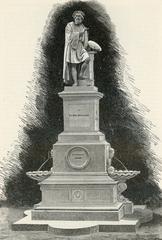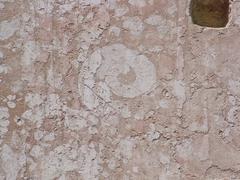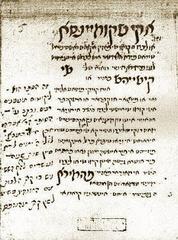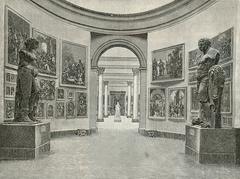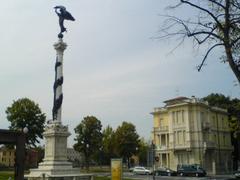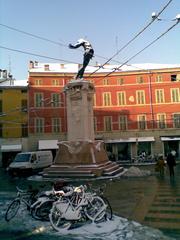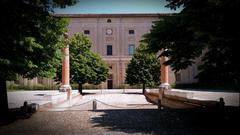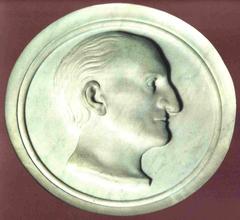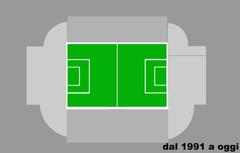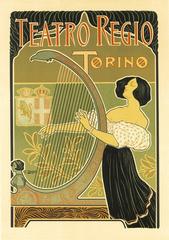
Visiting the Monument to Parmigianino in Parma, Italy: Tickets, Hours, and Tips
Date: 14/06/2025
Introduction
In the heart of Parma, Italy, the Monument to Parmigianino stands as a testament to the city’s deep-rooted Renaissance heritage. Dedicated to Francesco Mazzola—better known as Parmigianino—this monument celebrates one of Parma’s most influential artists and offers visitors a unique opportunity to connect with history, art, and culture. This comprehensive guide explores the monument’s historical significance, provides detailed visitor information, and highlights nearby attractions to ensure you make the most of your visit (Visit Italy; Finestre sull’Arte; Evendo).
Parmigianino: Life, Legacy, and Artistic Significance
Early Life and Formation
Born in 1503 in Parma, Parmigianino (“the little one from Parma”) was surrounded by art from an early age. Orphaned young, he was raised by his painter uncles, who nurtured his prodigious talent. Vasari, the famed Renaissance biographer, described him as a prodigy “born with brushes in his fingers” (Britannica; Artble). Parmigianino’s early works, such as the frescoes in the church of San Giovanni Evangelista, already revealed his mastery of perspective and innovative style (Finestre sull’Arte).
The 16th-Century Parma Context
Parmigianino’s career unfolded during a time of political upheaval, with Parma caught between rival powers. Despite such turbulence, the city fostered a vibrant artistic environment. The presence of artists like Correggio provided inspiration and opportunities for young Parmigianino (The History of Art).
Artistic Achievements and Mannerism
Parmigianino emerged as a pioneer of the Mannerist movement, characterized by elongated forms, elegant compositions, and a distinctive grace that departed from High Renaissance naturalism (Britannica). Notable works include the “Madonna with the Long Neck” and his “Self-Portrait in a Convex Mirror” (The Art Story). Many masterpieces can be found in Parma’s museums and churches, such as the Galleria Nazionale and the Basilica di Santa Maria della Steccata (Finestre sull’Arte).
Lasting Legacy in Parma
Parma is home to several of Parmigianino’s most significant works, making it a pilgrimage site for art lovers. Sites such as the Basilica di Santa Maria della Steccata and San Giovanni Evangelista display his frescoes, while the Galleria Nazionale houses his famous “Turkish Slave Girl” and self-portrait (Visit Italy). The Bardi Altarpiece in a nearby village further attests to his impact (Finestre sull’Arte).
The Monument to Parmigianino: Location, Features, and Visitor Information
Location and Description
The Monument to Parmigianino is located at Piazzale della Steccata, adjacent to the Basilica di Santa Maria della Steccata in central Parma. Designed by Giovanni Chierici and inaugurated in 1879, the statue is crafted from white marble and features Parmigianino holding a painter’s palette and brushes. The base includes sculpted female heads serving as fountains and the coats of arms of Parma and the Order of Saint Constantine, symbolizing civic and religious ties (Visit Italy; Evendo).
Visiting Hours and Admission
- Hours: The monument is outdoors and accessible 24/7, year-round.
- Tickets: No admission fee or ticket is required to visit.
Accessibility
The surrounding piazza is flat and wheelchair accessible, though visitors should be mindful of cobblestone streets. The area is pedestrian-friendly, with benches nearby for resting.
Special Features
- Talking Teens Project: The monument is part of the “Talking Teens” initiative, allowing visitors to call a number displayed on-site and listen to stories about Parmigianino in both English and the local dialect (Visit Italy).
- Informational Plaques: Descriptive plaques provide historical context (in Italian; translation apps may be helpful).
Practical Tips for Visiting
- Best Times: Spring and autumn offer mild weather; early mornings or late afternoons provide ideal lighting for photography.
- Combining Visits: Pair your stop at the monument with a visit to the nearby Basilica di Santa Maria della Steccata or Galleria Nazionale to explore more of Parmigianino’s works.
- Guided Tours: Local tourism offices and private companies offer city walking tours that include the monument and related Renaissance sites.
- Amenities: Numerous cafés, restrooms, and shops are available nearby.
- Dress Code: No special requirements for the monument, but modest attire is expected in churches.
Exploring Nearby Parma Historical Sites
- Basilica di Santa Maria della Steccata: Features Parmigianino’s frescoes and is located next to the monument.
- Galleria Nazionale (Complesso della Pilotta): Houses significant works by Parmigianino and other Renaissance masters.
- Parma Cathedral (Duomo di Parma) & Baptistery: Renowned for their artistic and architectural beauty.
- Church of San Giovanni Evangelista: Contains frescoes by both Correggio and Parmigianino (Google Arts & Culture).
- Palazzo della Pilotta: A cultural complex with museums and the historic Farnese Theater.
Accessibility and Getting There
- By Foot: The monument is within easy walking distance from the main train station and most central attractions.
- By Public Transport: The closest bus stop is Via Mazzini (lines 1, 2, 2N, 3, 4, 4N, 5, 8).
- For Mobility Needs: Flat surfaces and benches are available; consult the tourist office for detailed accessibility routes (Visit Parma).
Visitor Experience and Etiquette
- Photography: Allowed and encouraged—early morning and late afternoon provide the best lighting.
- Behavior: Please respect the monument and avoid climbing; maintain a respectful noise level.
Frequently Asked Questions (FAQ)
Q: What are the visiting hours for the Monument to Parmigianino?
A: The monument is accessible at all hours, every day.
Q: Is there an entrance fee?
A: No, visiting the monument is completely free.
Q: Are guided tours available?
A: Yes, many walking tours include the monument; check with local tourism offices.
Q: Is the monument wheelchair accessible?
A: Yes, though cobblestones may require caution.
Q: Can I take photos?
A: Absolutely. Photography is permitted, but drone use may be restricted in the historic center.
When to Visit and Local Events
- Best Months: April, May, September, and early October for mild weather and fewer crowds.
- Events: Early September features the Festival del Prosciutto—a city-wide food celebration (Visit Parma).
- Cultural Events: Piazza della Steccata often hosts concerts and community festivities (Evendo).
Visual and Digital Resources
- Images: Include high-resolution photos with descriptive alt text: “Monument to Parmigianino in Parma city center,” “White marble statue of Parmigianino holding painter’s palette,” “Fountain base of the monument,” “Basilica di Santa Maria della Steccata.”
- Maps: Use interactive maps to highlight the monument’s location and nearby attractions.
- Virtual Tours: Some tourism websites offer virtual tours of Parma’s historic sites.
Summary and Call to Action
The Monument to Parmigianino is a must-see for anyone exploring Parma’s rich artistic and historical landscape. Its central location, free access, and connection to sites showcasing Parmigianino’s masterpieces make it a highlight of the city. Enhance your visit by combining the monument stop with nearby museums and churches, and immerse yourself further with guided tours and interactive experiences like the “Talking Teens” project.
For additional tips, audio guides, and cultural updates, download the Audiala app. Keep up to date with upcoming events and explore more of Parma’s treasures by visiting the Official Parma Tourism Website.
References
- Visit Italy: Parma
- Evendo: Monumento al Parmigianino
- The Travel Folk: Things to Do in Parma
- Visit Parma
- Britannica: Parmigianino Biography
- Artble: Parmigianino Biography
- Finestre sull’Arte: Works by Parmigianino in Parma
- The Art Story: Parmigianino
- Our Escape Clause: Things to Do in Parma
- Emilia Delizia: Palazzo Marchi
- Google Arts & Culture: San Giovanni Evangelista
